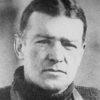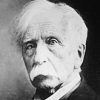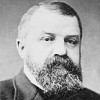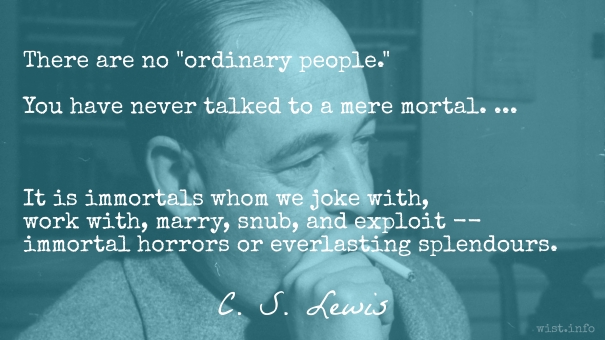We are all motivated by a keen desire for praise, and the better a man is, the more he is inspired by glory.
[Trahimur omnes studio laudis et optimus quisque maxime gloria ducitur.]
Marcus Tullius Cicero (106-43 BC) Roman orator, statesman, philosopher
Pro Archia Poeta [For Archia the Poet], ch. 11 / sec. 26 (62 BC) [tr. Guinach (1962)]
(Source)
(Source (Latin)). Other translations:We are all influenced by a desire of praise, and the best men are the most especially attracted by glory.
[tr. Yonge (1856)]We are all drawn away by an eagerness after praise, and even the very least of men is most led by fame.
[tr. M'Donogh Mahony (1886)]We are all drawn on by a desire of praise, and each best one is led chiefly by glory.
[tr. Dewey (1916)]Ambition is an universal factor in life, and the nobler a man is, the more susceptible is he to the sweets of fame.
[tr. Watts (Loeb) (1923)]We are all drawn on by the pursuit of praise, and all the best of us are so led by glory in the highest degree.
[tr. Allcroft/Plaistowe (c. 1925)]We are all motivated by the desire for praise, and the best people are the ones who are most attracted by glory.
[tr. Berry (2000)]
Quotations about:
glory
Note not all quotations have been tagged, so Search may find additional quotes on this topic.
The life given us by nature is short; but the memory of a well-spent life is eternal.
[Brevis a natura nobis vita data est; at memoria bene reditae vitae sepiterna.]
Marcus Tullius Cicero (106-43 BC) Roman orator, statesman, philosopher
Philippics [Philippicae; Antonian Orations], No. 14, ch. 12 / sec. 32 (14.12/14.32) (43-04-21 BC) [ed. Hoyt (1896)]
(Source)
Asking the Senate to honor the Fourth and Martian legions for their victory over Antony at the Battle of Forum Gallorum.
(Source (Latin)). Other translations:Short is the life which nature has given us: but the memory of a life nobly laid down is eternal.
[ed. Harbottle (1897)]A brief life has been allotted to us by nature; but the memory of a well-spent life is imperishable.
[tr. Yonge (1903)]Brief is the life given us by nature; but the memory of life nobly resigned is everlasting.
[tr. Ker (Loeb) (1926)]
DON SALLUSTE: Popularity? It is glory’s small change.
[La popularité ? c’est la gloire en gros sous.]
Victor Hugo (1802-1885) French writer
Ruy Blas, Act 3, sc. 5 (1838) [Latham & Curle (1909)]
(Source)
This translation, which is not sourced in the quote book in question, was picked up by Bartlett's and since spread in popularity.
The passage this is from is, in most translations, cut from the play or paraphrased.
(Source (French)). Other translation:And popularity? A rattling noise, believed to be
Glory.
[tr. Crosland (1995)]
KING RICHARD: You may my glories and my state depose
But not my griefs; still am I king of those.William Shakespeare (1564-1616) English dramatist and poet
Richard II, Act 4, sc. 1, l. 201ff (4.1.201-202) (1595)
(Source)
When Bolingbroke questions Richard's willingness to abdicate while grieving over the loss.
So glorious is the recovery of liberty that in regaining liberty we must not shrink even from death.
[Ita praeclara est recuperatio libertatis ut ne mors quidem sit in repetenda libertate fugienda.]
Marcus Tullius Cicero (106-43 BC) Roman orator, statesman, philosopher
Philippics [Philippicae; Antonian Orations], No. 10, ch. 9 / sec. 20 (10.9/10.20) (43-02 BC) [tr. Ker (Loeb) (1926)]
(Source)
(Source (Latin)). Other translations:The recovery of freedom is so splendid a thing that we must not shun even death when seeking to recover it.
[tr. Yonge (1903)]So glorious is the reclamation of freedom that not even death should be avoided when freedom must be regained.
[tr. @sentantiq (2017)]
AMYRUS: Let Earth and Heaven his timeless death deplore,
For both their worths shall equal him no more.Christopher "Kit" Marlowe (1564-1593) English dramatist and poet
Tamburlaine the Great, Part 2, Act 5, sc. 3 (c. 1587)
Final lines of the play. More on Timur (Tamerlane, Tamburlaine).
CHORUS: Fools who fain would carve a name
Of honour in the fields of fame,
Valiant in the press of war,
Men and fighters — fools they are!
How shall death and wounds and shame
Heal the world’s distrated life?
Vain endeavour! Strife of strife
Misbegotten bringeth no release,
Nor by conquest shall man conquer peace.[ΧΟΡΟΣ: ἄφρονες ὅσοι τὰς ἀρετὰς πολέμῳ
λόγχαισί τ᾽ ἀλκαίου δορὸς
κτᾶσθε, πόνους ἀμαθῶς θνα-
τῶν καταπαυόμενοι:
εἰ γὰρ ἅμιλλα κρινεῖ νιν
αἵματος, οὔποτ᾽ ἔρις
λείψει κατ᾽ ἀνθρώπων πόλεις]Euripides (485?-406? BC) Greek tragic dramatist
Helen [Ἑλένη], l. 1151ff, Stasimon 1, Antistrophe 2 (412 BC) [tr. Sheppard (1925)]
(Source)
(Source (Greek)). Other translations:Think you, fond men, whose martial pride
Glows 'midst the bleeding ranks of war,
By the couragous spear
The strife of mortals to decide?
Vain are your thoughts: should rage abhor'd
That glories in the purple flood,
The contest only end with blood,
Unsheath'd through angry states would flame the sword.
[tr. Potter (1783)]Frantic are ye who seek renown
Amid the horrors of th' embattled field,
Who masking guile beneath a laurel crown
With nervous arm the falchion wield,
Not slaughtered thousands can your fury state.
If still success the judgment guide,
If bloody battle right and wrong decide,
Incessant strive must vex each rival state.
[tr. Wodhull (1809)]Foolish ye, as many as obtain [the renown of] valor by war, foolishly resting form the toils of mortals in the spears of valiant war. For if the contest of blood is to determine [men's quarrels], never will strife leave the cities of men.
[tr. Buckley (1850)]You are fools, who try to win a reputation for virtue through war and marshalled lines of spears, senselessly putting an end to mortal troubles; for if a bloody quarrel is to decide it, strife will never leave off in the towns of men.
[tr. Coleridge (1891)]O fools! all ye who try to win the meed of valour through war and serried ranks of chivalry, seeking thus to still this mortal coil, in senselessness; for if bloody contests are to decide, there will never be any lack of strife in the towns of men.
[tr. Coleridge (alt.)]Madmen, all ye who strive for manhood's guerdons
Battling with shock of lances, seeking ease
Senselessly so from galling of life's burdens!
Never, if blood be arbitress of peace,
Strife between towns of men shall find an ending.
[tr. Way (Loeb) (1912)]Madness it is to attempt to find virtue in war
and the blades of the spear in the fight,
so ignorantly to relieve the misfortunes of men.
For if a contest of blood is the arbiter, then there will always
be strife in the cities of men.
[tr. Warner (1951)]You who in earnest ignorance
Would check the deeds of lawless men,
And in the clash of spear on spear
Gain honour -- you are all stark mad!
If men, to settle each dispute
Must needs compete in bloodshed, when
Shall violence vanish, hate be soothed,
Or men and cities live in peace?
[tr. Vellacott (1954), Strophe 2]Mindless, all of you, who in the strength of spears
and the tearing edge win your valors
by war, thus stupidly trying
to halt the grief of the world.
For if bloody debate shall settle
the issue, never again
shall hate be gone out of the cities of men.
[tr. Lattimore (1956)]What fools you are, all who seek to gain honour in war and the clash of spear on spear, stupidly trying to solve men’s troubles by death! If they are to be settled by contest of blood, never will strife end among the cities of men.
[tr. Davie (2002)]You are mad,
You men
Who think that war's
The proof of manhood,
Squabbling with spears and lances --
A futile way
To solve man's problems.
If we settle things
By seeing who can bleed the most,
War will always
Haunt our cities.
[tr. A. Wilson (2007)]Men! What fools they are when they look for glory with spears on the harsh battlefield!
How foolish your efforts to end men’s pains through slaughter!
If it is blood you wish to be the judge of right or wrong in the arguments between men, then war will never leave the cities.
[tr. Theodoridis (2011)]You are fools who would acquire virtue in war
and sharpened point of mighty spear --
stupidly coming to terms with toil -- but your death is the price.
And if a conflict of blood decide, then the strife never will
forsake the cities of mankind.
[tr. Ambrose et al. (2018)]You are fools, who try to win a reputation for virtue [aretē] through war and marshalled lines of spears, senselessly putting an end to mortal troubles [ponos]; for if a bloody quarrel is to decide [krinein] it, strife [eris] will never leave off in the cities [polis] of men
[tr. Coleridge / Helen Heroization Team]
But I am particularly afraid that, ignorant of the true path to glory, you may consider that it is more glorious for you to have more power than everyone else together and prefer to be feared rather than be respected by your fellow-citizens.
[Illud magis vereor, ne ignorans verum iter gloriae gloriosum putes plus te unum posse quam omnes et metui a civibus tuis.]
Marcus Tullius Cicero (106-43 BC) Roman orator, statesman, philosopher
Philippics [Philippicae; Antonian Orations], No. 1, ch. 14 / sec. 33 (1.14/1.33.9) (44-09-02 BC) [tr. McElduff (2011)]
(Source)
Addressed to Mark Antony
(Source (Latin)). Other translations:I see more reason to fear that through ignorance of the true road to glory you should think that it consists in being more powerful than all your fellow-citizens, and in being the object of their dread.
[tr. King (1877)]What I am more afraid of is lest, being ignorant of the true path to glory, you should think it glorious for you to have more power by yourself than all the rest of the people put together, and lest you should prefer being feared by your fellow-citizens to being loved by them.
[tr. Yonge (1903)]What I more fear is this -- that, blind to glory's true path, you may think it glorious to possess in your single self more power than all, and to be feared by your fellow-citizens.
[tr. Ker (Loeb) (1926)]I fear more that, ignorant of the true path to glory, you may think it glorious for you alone to be more powerful than all, and feared by your fellow-citizens.
[tr Wiseman]
Nothing is more detestable than disgrace, nothing more shameful than slavery. We have been born for glory and freedom — let us either hold on to these things or die with dignity.
[Nihil est detestabilius dedecore, nihil foedius servitute. Ad decus et ad libertatem nati sumus; aut haec teneamus aut cum dignitate moriamur.]
Marcus Tullius Cicero (106-43 BC) Roman orator, statesman, philosopher
Philippics [Philippicae; Antonian Orations], No. 3, ch. 14 / sec. 36 (3.14/3.36) (44-12-20 BC) [tr. @sentantiq (2019)]
(Source)
(Source (Latin)). Other translations:Nothing is more detestable than disgrace, nothing fouler than servitude. It is to glory and to liberty we were born; let us either hold fast to these or die with dignity.
[tr. Yonge (1903)]There is nothing more detestable than disgrace; nothing more shameful than slavery. We have been born to glory and to liberty; let us either preserve them or die with dignity.
[tr. Ker (Loeb) (1926)]Nothing is more abominable than disgrace, nothing is uglier than slavery. We were born for honor and freedom: let us either retain them or die with dignity.
[tr. Manuwald (2007)]
Of what value is fame, when one cannot enjoy posthumous fame?
[Was liegt am Ruhm, da man den Nachruhm nicht erleben kann?]
Marie von Ebner-Eschenbach (1830-1916) Austrian writer
Aphorisms [Aphorismen], No. 293 (1880) [tr. Wister (1883)]
(Source)
I stood in Venice, on the “Bridge of Sighs”;
A Palace and a prison on each hand:
I saw from out the wave her structures rise
As from the stroke of the Enchanter’s wand:
A thousand Years their cloudy wings expand
Around me, and a dying Glory smiles
O’er the far times, when many a subject land
Looked to the wingéd Lion’s marble piles,
Where Venice sat in state, throned on her hundred isles!George Gordon, Lord Byron (1788-1824) English poet
Childe Harold’s Pilgrimage, Canto 4, st. 1 (1818)
(Source)
This stanza was written by at least 1817-07-01. Much of the legend of the "Bridge of Sighs" (Ponte de' Sospiri) was made up or misunderstood by Byron, but created a myth that tour guides in Venice repeat to this day.
There are two things which ought to teach us to think but meanly of human glory: the very best have had their calumniators, the very worst their panegyrists.
Charles Caleb "C. C." Colton (1780-1832) English cleric, writer, aphorist
Lacon: Or, Many Things in Few Words, Vol. 1, § 523 (1820)
(Source)
Esteem is worth more than celebrity, respect is worth more than renown, and honor is worth more than fame.
[L’estime vaut mieux que la célébrité, la considération vaut mieux que la renommée, et l’honneur vaut mieux que la gloire.]
Nicolas Chamfort (1741-1794) French writer, epigrammist (b. Nicolas-Sébastien Roch)
Products of Perfected Civilization [Produits de la Civilisation Perfectionée], Part 1 “Maxims and Thoughts [Maximes et Pensées],” ch. 2, ¶ 131 (1795) [tr. Merwin (1969)]
(Source)
(Source (French)). Alternate translations:Esteem is better than celebrity, respect is better than renown, and honour than glory.
[tr. Mathers (1926)]Esteem is worth more than being celebrated, respect is better than renown, and honour is better than fame.
[tr. Pearson (1973)]Esteem is worth more than celebrity, consideration is worth more than fame, and honor is worth more than glory.
[tr. Siniscalchi (1994)]
Poets, orators, even philosophes, say the same things about fame we were told as boys to encourage us to win prizes. What they tell children to make them prefer being praised by their nannies to eating jam tarts is the same idea constantly drummed into us to encourage us to sacrifice our real interests in the hope of being praised by our contemporaries or by posterity.
[Ce que les poètes, les orateurs, même quelques philosophes nous disent sur l’amour de la Gloire, on nous le disait au Collège, pour nous encourager à avoir les prix. Ce que l’on dit aux enfans pour les engager à préférer à une tartelette les louanges de leurs bonnes, c’est ce qu’on répète aux hommes pour leur faire préférer à un intérêt personnel les éloges de leurs contemporains ou de la postérité.]Nicolas Chamfort (1741-1794) French writer, epigrammist (b. Nicolas-Sébastien Roch)
Products of Perfected Civilization [Produits de la Civilisation Perfectionée], Part 1 “Maxims and Thoughts [Maximes et Pensées],” ch. 1, ¶ 85 (1795) [tr. Parmée (2003), ¶ 69]
(Source)
(Source (French)). Alternate translations:The things which poets, orators, and even a few philosophers tell us about the love of Glory, are exactly the things we are told at College to encourage us to win prizes. And what they say to children to make them prefer the praise of their nurses to a tartlet, they repeat to grown men to make them prefer the eulogy of their fellows or of posterity to personal advantage.
[tr. Mathers (1926)]All that the poets, the orators, and even certain philosophers tell us about the love of fame we were told at school to urge us to win prizes. All that is said to encourage children to prefer the praise of their mentors to a piece of pie is repeated to men to make them consider their personal profit less desirable than the plaudits of their contemporaries and of posterity.
[tr. Merwin (1969)]Things said by poets, orators, even some philosophers, about love of glory, were told to us at the Collège to encourage us to win prizes. What children are told to incline them to prefer a slice of tart to their nurses' approval, is the same as what men are repeatedly told to make them put the commendation of their contemporaries, or that of posterity, before their personal interest.
[tr. Pearson (1973)]What poets, orators, even several philosophers have said about the love of fame, was told to us at school to encourage us to win prizes.
[tr. Dusinberre (1992)]What poets, orators, and even philosophers say to us about love of glory is the same as what people said to us in the colleges to encourage us to compete for prizes. What people tell children to make them prefer the praise of their nurses to something silly is the same thing that people repeat to men to make them prefer the praise of their contemporaries or of posterity to their own self-interest.
[tr. Siniscalchi (1994)]
The glory of the One Who moves all things
shines through the universe and is reflected
by all things in proportion to their merit.[La gloria di colui che tutto move
per l’universo penetra, e risplende
in una parte più e meno altrove.]Dante Alighieri (1265-1321) Italian poet
The Divine Comedy [Divina Commedia], Book 3 “Paradiso,” Canto 1, l. 1ff (1.1-3) (1320) [tr. Musa (1984)
(Source)
God as the "unmoved mover" derives from Aristotle (Metaphysics 12.7), frequently referenced in medieval Scholastic writings.
Musa provides this variant translation as "a more interpretive rendering" in his notes (and a rendering similar to Ciardi's). His more literal translation, which he uses in the main text, is given below.
(Source (Italian)). Alternate translations:His Glory, who, with solitary hand,
Launches thro' boundless space the stellar Band,
And shines effulgent, or involves his Throne
In darkness, as he wills ....
[tr. Boyd (1802), st. 1]His glory, by whose might all things are mov’d,
Pierces the universe, and in one part
Sheds more resplendence, elsewhere less.
[tr. Cary (1814)]The glory of Him who moveth all things
Pierceth the universe, and shines so fair,
More at one part, and less, perchance, elsewhere.
[tr. Bannerman (1850)]The glory of Him who moveth everything
Doth penetrate the universe, and shine
In one part more and in another less.
[tr. Longfellow (1867)]The glory of Him who moves all things penetrates through the universe, and shines forth in one quarter more, and less in another.
[tr. Butler (1885)]His glory who moves all doth penetrate
Throughout the universe, and shineth bright
Here with a greater, there with lesser state.
[tr. Minchin (1885)]The glory of Him who moves everything penetrates through the universe, and shines in one part more and in another less.
[tr. Norton (1892)]The All-mover's glory penetrates through the universe, and regloweth in one region more, and less in another.
[tr. Wicksteed (1899)]The glory of Him who moves all things penetrates the universe and shines in one part more and in another less.
[tr. Sinclair (1939)]The glory of Him who moveth all that is
Pervades the universe, and glows more bright
In the one region, and in another less.
[tr. Binyon (1943)]The glory of Him who moves all things soe’er
Impenetrates the universe, and bright
The splendour burns, more here and lesser there.
[tr. Sayers/Reynolds (1962)]The glory of Him who moves all things rays forth
through all the universe, and is reflected
from each thing in proportion to its worth.
[tr. Ciardi (1970)]The glory of the All-Mover penetrates through the universe and reglows in one part more, and in another less.
[tr. Singleton (1975)]The glory of him who moves everything
Penetrates the universe and shines
In one part more and, in another, less.
[tr. Sisson (1981)]the glory of the One who moves all things
permeates the universe and glows
in one part more and in another less.
[tr. Mandelbaum (1984)]The glory of the One Who moves all things
penetrates all the universe and shines
in one part more and in another less.
[tr. Musa (1984)]The glory of Him who moves all things
penetrates through the universe and shines
forth in one place more and less elsewhere
[tr. Durling (2011)]The glory of Him, who moves all things, penetrates the universe, and glows in one region more, in another less.
[tr. Kline (2002)]Glory, from Him who moves all things that are,
penetrates the universe and then shines back,
reflected more in one part, less elsewhere.
[tr. Kirkpatrick (2007)]The glory of Him who moves all things
pervades the universe and shines
in one part more and in another less.
[tr. Hollander/Hollander (2007)]The Glory of He who made and moves it all
Penetrates the entire universe
Glowing in one part more, in another less.
[tr. Raffel (2010)]The glory of the Animator of Everything
Pervades the universe and shines more
In one area and less somewhere else.
[tr. Bang (2021)]
I certainly had not the smallest reason to fear that the execution of this murderer of Roman citizens would cause me to be blamed by posterity. And indeed, even if this were a serious danger, I have always been convinced that unpopularity earned by honourable actions is not unpopularity at all, but renown.
[Certe verendum mihi non erat, ne quid hoc parricida civium interfecto invidiae mihi in posteritatem redundaret. Quodsi ea mihi maxime inpenderet tamen hoc animo fui semper, ut invidiam virtute partam gloriam, non invidiam putarem.]Marcus Tullius Cicero (106-43 BC) Roman orator, statesman, philosopher
Orationes in Catilinam [Catilinarian Orations], No. 1, § 12, cl. 29 (1.12.29) (63-11-08 BC) [tr. Grant (1960)]
(Source)
(Source (Latin)). Alternate translations:Truly I have no reason to fear, least this Murderer of the Citizens being slain, any envy should rise against me for the future. But if never so much did hang over me, yet I was alwayes of this Judgment, to think Envy gotten by Vertue to be no Envy but Glory.
[tr. Wase (1671)]I could have no reason to fear; that for the execution of a traitor and a parricide I should stand condemned by the voice of posterity. But let me add, were the severest censure to be the certain consequence, it has ever been my settled opinion, that reproach, when earned by virtue, is not reproach, but the truest glory.
[tr. Sydney (1795)]Surely I had no cause to fear lest for slaying this parricidal murderer of the citizens any unpopularity should accrue to me with posterity. And if it did threaten me to ever so great a degree, yet I have always been of the disposition to think unpopularity earned by virtue and glory, not unpopularity.
[tr. Yonge (1856)]Surely it was not to be dreaded by me, lest, if this parricide of the citizens were slain, any odium might redound for me to posterity. But if that impended over myself in particular, yet I have always been of this opinion, that I should consider the odium acquired by merit as glory and not as odium.
[tr. Mongan (1879)]Certainly it was not to be feared to (by) me, lest any (thing) of unpopularity might redound to me unto posterity, this parricide of citizens being slain. But if it might impend (threaten) to me mostly (very much), yet I have been always with this mind, that I might think envy produced by virtue, glory, not envy.
[tr. Underwood (1885)]Certainly it was not to be feared by me, lest any ill-will should redound to [affect] me for posterity, this parricide of citizens having been slain. But if this should threaten me very much, yet I have been always with [of] this mind, that I should think ill will produced by virtue, glory, not ill will.
[tr. Dewey (1916)]Certainly I did not have to fear, lest with this parricide of citizens having been killed, anything of unpopularity might run over in posterity. And yet, if these were to threaten me especially, however, I have always been in this mind, so that I thought that unpopularity obtained by virtue is an honour, not unpopularity at all.
[IB Notes]I have always been of the opinion that infamy earned by doing what is right is not infamy at all, but glory.
[E.g.]
The fable of Tantalus has generally been regarded as symbolizing avarice. It’s at least equally applicable to ambition, love of fame, indeed to almost every passion.
[La fable de Tantale n’a presque jamais servi d’emblème qu’à l’avarice. Mais elle est, pour le moins, autant celui de l’ambition, de l’amour de la gloire, de presque toutes les passions.]Nicolas Chamfort (1741-1794) French writer, epigrammist (b. Nicolas-Sébastien Roch)
Products of Perfected Civilization [Produits de la Civilisation Perfectionée], Part 1 “Maxims and Thoughts [Maximes et Pensées],” ch. 1, ¶ 70 (1795) [tr. Parmée (2003), ¶ 58]
(Source)
(Source (French)). Alternate translations:The fable of Tantalus is hardly ever applied except to the passion of avarice; but it is at least as applicable to ambition, to the love of glory, and to nearly all the other passions.
[tr. Mathers (1926)]The fable of Tantalus has been used almost exclusively as an emblem of avarice, but it is at least as applicable to ambition, the love of fame, and virtually all the passions.
[tr. Merwin (1969)]The fable of Tantalus has almost never served as a precept except in the case of avarice. But it is, at all events, a precept attaching no wit less to ambition, to love of glory, to almost all passions.
[tr. Pearson (1973)]The fable of Tantalus has nearly only ever served as an emblem of avarice. However, it is at least as much a symbol of ambition, of the love of glory, and of nearly every passion.
[tr. Siniscalchi (1994)]
All my life through, the new sights of Nature made me rejoice like a child.
Marie Curie (1867-1934) Polish-French physicist and chemist [b. Maria Salomea Skłodowska]
Pierre Curie, “Autobiographical Notes: Marie Curie,” ch. 1 (1923) [tr. Kellogg/Kellogg]
(Source)
Miserable mortals! Can we contribute to the honour and glory of God? I could wish that expression were struck out of our prayer books.
There must be a beginning of any great matter, but the continuing unto the end until it be thoroughly finished yields the true glory.
Francis Drake (c. 1540-1596) English explorer, sea captain, politician
Letter to Francis Walsingham, from Sagres, Portugal (17 May 1587)
(Source)
People are egregiously mistaken if they think they ever can attain to permanent popularity by hypocrisy, by mere outside appearances, and by disguising not only their language but their looks. True popularity takes deep root and spreads itself wide; but the false falls away like blossoms; for nothing that is false can be lasting.
[Quodsi qui simulatione et inani ostentatione et ficto non modo sermone, sed etiam voltu stabilem se gloriam consequi posse rentur, vehementer errant. Vera gloria radices agit atque etiam propagatur, ficta omnia celeriter tamquam flosculi decidunt, nee simulatum potest quicquam esse diuturnum.]
Marcus Tullius Cicero (106-43 BC) Roman orator, statesman, philosopher
De Officiis [On Duties; On Moral Duty; The Offices], Book 2, ch. 12 (2.12) / sec. 43 (44 BC) [tr. Edmonds (1865)]
(Source)
(Source (Latin)). Alternate translation:Those people therefore are highly mistaken, who think of obtaining a solid reputation by vain shows and hypocritical pretences; by composed countenances and studied forms of words: for true glory takes deep root, and grows and flourishes more and more; but that which is only in show and mere outside, quickly decays and withers like flowers; nor can anything be lasting that is only counterfeit.
[tr. Cockman (1699)]But if any suppose, that they can obtain a stable reputation by pretences, empty ostentation, hypocritical conversation, and even artificial looks, they are extremely mistaken. True fame takes deep root, and extends its shoots. Every counterfeit appearance, like blossoms, quickly falls off; and no pretense can be lasting.
[tr. McCartney (1798)]If there be those who think to obtain enduring fame by dissembling and empty show, and by hypocrisy, not only of speech, but of countenance also, they are utterly mistaken. True fame strikes its roots downward, and sends out fresh shoots; all figments fall speedily, like blossoms, nor can anything feigned be lasting.
[tr. Peabody (1883)]It is a delusion to suppose that glory can be founded on dissimulation, vain ostentation, and studied words and looks. True glory strikes root and spreads, everything unreal soon falls like the blossoms, a lie cannot last.
[tr. Gardiner (1899)]True glory strikes roots, and grows: ill-founded reputations, like flowers, soon wither, nor can anything last long which is based on pretence.
[ed. Harbottle (1906)]For if anyone thinks that he can win lasting glory by pretence, by empty show, by hypocritical talk and looks, he is very much mistaken. True glory strikes deep root and spreads its branches wide; but all pretences soon fall to the ground like fragile flowers, and nothing counterfeit can be lasting.
[tr. Miller (1913)]If anyone thinks he can attain lasting glory by mimicry, by empty shows, by pretense in his looks and his conversation, he is far from correct. Genuine glory puts down roots and even sends out new growth; any pretense dies down quickly, like fragile flowers. Nothing simulated can be long-lasting.
[tr. Edinger (1974)]
Even here
Worth wins her due, and there are tears to flow,
And human hearts to feel for human woe.[Sunt hic etiam sua praemia laudi,
Sunt lacrimae rerum et mentem mortalia tangunt.]Virgil (70-19 BC) Roman poet [b. Publius Vergilius Maro; also Vergil]
The Aeneid [Ænē̆is], Book 1, l. 461ff (1.461-462) (29-19 BC) [tr. Taylor (1907), st. 61, l. 543ff]
(Source)
Aeneas, on seeing murals of the Trojan Wars in Carthage. (Source (Latin)). Alternate translations:Lo! Priam here, reward here vertue finds;
Troy teares, and humane sufferings pittying minds.
[tr. Ogilby (1649)]Ev'n the mute walls relate the warrior's fame,
And Trojan griefs the Tyrians' pity claim.
[tr. Dryden (1697)]Even here praiseworthy deeds meet with due reward: here are tears for misfortunes, and the breasts are touched with human woes.
[tr. Davidson/Buckley (1854)]Aye, praise waits on worth
E'en in this corner of the earth;
E'en here the tear of pity springs,
And hearts are touched by human things.
[tr. Conington (1866)]Worthy deeds e'en here are praised.
And mortal sufferings move their thoughts and tears.
[tr. Cranch (1872), l. 601ff]Here too is the meed of honour, here mortal estate touches the soul to tears.
[tr. Mackail (1885)]And even here belike deed hath its own reward.
Lo here are tears for piteous things that touch men's hearts anigh.
[tr. Morris (1900)]Virtue's wage is given --
O even here! Here also there be tears
for what men bear, and mortal creatures feel
each other's sorrow.
[tr. Williams (1910)]Here, too, virtue has its due rewards; here, too, there are tears for misfortune and mortal sorrows touch the heart.
[tr. Fairclough (1916)]Look! even here there are rewards for praise,
There are tears for things, and what men suffer touches
The human heart.
[tr. Humphries (1951)]Here too we find virtue somehow rewarded.
Tears in the nature of things, hearts touched by human transience.
[tr. Day Lewis (1952)]Here, too, the honorable finds its due
and there are tears for passing things; here, too,
things mortal touch the mind.
[tr. Mandelbaum (1971), l. 654ff]Even so far away
Great valor has due honor; they weep here
For how the world goes, and our life that passes
Touches their hearts.
[tr. Fitzgerald (1981), l. 627ff]Here too there is just reward for merit, there are tears for suffering and men's hearts are touched by what man has to bear.
[tr. West (1990)]Here too virtue has its rewards, here too
there are tears for events, and mortal things touch the heart.
[tr. Kline (2002)]Here, too, honor matters;
Here are the tears of the ages, and minds touched
By human suffering.
[tr. Lombardo (2005)]Even here, merit will have its true reward ...
even here, the world is a world of tears
and the burdens of mortality touch the heart.
[tr. Fagles (2006)]Here too, glory has its rewards; the world weeps, and mortal matters move the heart.
[tr. Bartsch (2021)]
Even if glory has nothing in itself to justify seeking it, yet it follows virtue like a shadow.
[Etsi enim nihil habet in se gloria cur expetatur, tamen virtutem tamquam umbra sequitur.]
Marcus Tullius Cicero (106-43 BC) Roman orator, statesman, philosopher
Tusculan Disputations [Tusculanae Disputationes], Book 1, ch. 45 (1.45) / sec. 109 (45 BC) [tr. Douglas (1985)]
(Source)
(Source (Latin)). Alternate translations:For though Glory have nothing in it self, why it should be pursu'd, yet it follows Vertue as its shadow.
[tr. Wase (1643)]For although there be nothing in glory to make it desirable, yet it follows virtue like a shadow.
[tr. Main (1824)]Glory follows virtue as it it were its shadow.
[Source (1826)]For even if glory contain nothing for which it is desirable of itself, yet it follows as the shadow of virtue.
[tr. Otis (1839)]For although there be nothing in glory to make it desirable, yet it follows virtue as its shadow.
[tr. Yonge (1853)]Though as to fame, there is nothing in it that should make it an object of desire; but it follows virtue like its shadow.
[tr. Peabody (1886)]Glory, though it have in itself nothing for which we should desire it, attends virtue like its shadow.
[tr. Black (1889)]Although glory is not to be sought for its own sake, it follows virtue like a shadow.
[tr. Habinek (1996)]Even if glory has nothing in it to justify our seeking it, yet it follows virtue like a shadow.
[tr. Davie (2017)]
All I say is, if you wish to see Nature robed in her mantle of might, look at a storm at sea; if you want to see her robed in her mantle of glory, look at a sunset at sea.
Ernest Henry Shackleton (1874-1922) Anglo-Irish Antarctic explorer
Journal aboard the Hoghton Tower (1891)
(Source)
Ah my friend, if you and I could escape this fray
and live forever, never a trace of age, immortal,
I would never fight on the front lines again
or command you to the field where men win fame.
But now, as it is, the fates of death await us,
thousands poised to strike, and not a man alive
can flee them or escape — so in we go for attack!
Give our enemy glory or win it for ourselves![Ὦ πέπον εἰ μὲν γὰρ πόλεμον περὶ τόνδε φυγόντε
αἰεὶ δὴ μέλλοιμεν ἀγήρω τ’ ἀθανάτω τε
ἔσσεσθ’, οὔτέ κεν αὐτὸς ἐνὶ πρώτοισι μαχοίμην
οὔτέ κε σὲ στέλλοιμι μάχην ἐς κυδιάνειραν·
νῦν δ’ ἔμπης γὰρ κῆρες ἐφεστᾶσιν θανάτοιο
μυρίαι, ἃς οὐκ ἔστι φυγεῖν βροτὸν οὐδ’ ὑπαλύξαι,
ἴομεν ἠέ τῳ εὖχος ὀρέξομεν ἠέ τις ἡμῖν.]Homer (fl. 7th-8th C. BC) Greek author
The Iliad [Ἰλιάς], Book 12, l. 322ff (12.322-328) [Sarpedon to Glaukos] (c. 750 BC) [tr. Fagles (1990), ll. 374-81]
Original Greek. Alt. trans.:O friend, if keeping back
Would keep back age from us, and death, and that we might not wrack
In this life’s human sea at all, but that deferring now
We shunn’d death ever, nor would I half this vain valour show,
Nor glorify a folly so, to wish thee to advance;
But since we must go, though not here, and that, besides the chance
Propos’d now, there are infinite fates of other sort in death,
Which, neither to be fled nor ’scap’d, a man must sink beneath,
Come, try we, if this sort be ours, and either render thus
Glory to others, or make them resign the like to us.
[tr. Chapman (1611), ll. 323-33]Could all our care elude the gloomy grave,
Which claims no less the fearful than the brave,
For lust of fame I should not vainly dare
In fighting fields, nor urge thy soul to war;
But since, alas! ignoble age must come,
Disease, and death's inexorable doom;
The life which others pay, let us bestow,
And give to fame what we to nature owe;
Brave though we fall, and honoured if we live,
Or let us glory gain, or glory give!
[tr. Pope (1715-20)]Oh Glaucus, if escaping safe the death
That threats us here, we also could escape
Old age, and to ourselves secure a life
Immortal, I would neither in the van
Myself expose, nor would encourage thee
To tempt the perils of the glorious field.
But since a thousand messengers of fate
Pursue us close, and man is born to die --
E’en let us on; the prize of glory yield,
If yield we must, or wrest it from the foe.
[tr. Cowper (1791), ll. 389-98]O dear friend, if indeed, by escaping from this war, we were destined to be ever free from old age, and immortal, neither would I combat myself in the van, nor send thee into the glorious battle. But now -- for of a truth ten thousand Fates of death press upon us, which it is not possible for a mortal to escape or avoid -- let us on: either we shall give glory to some one, or some one to us.
[tr. Buckley (1860)]O friend! if we, survivors of this war,
Could live, from age and death for ever free,
Thou shouldst not see me foremost in the fight,
Nor would I urge thee to the glorious field:
But since on man ten thousand forms of death
Attend, which none may ’scape, then on, that we
May glory on others gain, or they on us!
[tr. Derby (1864)]Ah, friend, if once escaped from this battle we were for ever to be ageless and immortal, neither would I fight myself in the foremost ranks, nor would I send thee into the war that giveth men renown, but now -- for assuredly ten thousand fates of death do every way beset us, and these no mortal may escape nor avoid -- now let us go forward, whether we shall give glory to other men, or others to us.
[tr. Leaf/Lang/Myers (1891)]My good friend, if, when we were once out of this fight, we could escape old age and death thenceforward and for ever, I should neither press forward myself nor bid you do so, but death in ten thousand shapes hangs ever over our heads, and no man can elude him; therefore let us go forward and either win glory for ourselves, or yield it to another.
[tr. Butler (1898)]Ah friend, if once escaped from this battle we were for ever to be ageless and immortal, neither should I fight myself amid the foremost, nor should I send thee into battle where men win glory; but now -- for in any case fates of death beset us, fates past counting, which no mortal may escape or avoid -- now let us go forward, whether we shall give glory to another, or another to us.
[tr. Murray (1924)]Man, supposing you and I, escaping this battle,
would be able to live on forever, ageless, immortal,
so neither would I myself go on fighting in the foremost,
nor would I urge you into the fighting where men win glory.
But now, seeing that the spirits of death stand close about us
in their thousands, no man can turn aside or escape them,
let us go on and win glory for ourselves, or yield it to others.
[tr. Lattimore (1951)]But now a thousand shapes of death surround us,
and no man can escape the, or be safe. Let us attack --
whether to give some fellow glory or to win it from him.
[tr. Fitzgerald (1974)]
As stars in the night sky glittering
round the moon’s brilliance blaze in all their glory
when the air falls to a sudden, windless calm …
all the lookout peaks stand out and the jutting cliffs
and the steep ravines and down from the high heavens bursts
the boundless, bright air and all the stars shine clear
and the shepherd’s heart exults.[Ὡς δ’ ὅτ’ ἐν οὐρανῷ ἄστρα φαεινὴν ἀμφὶ σελήνην
φαίνετ’ ἀριπρεπέα, ὅτε τ’ ἔπλετο νήνεμος αἰθήρ·
ἔκ τ’ ἔφανεν πᾶσαι σκοπιαὶ καὶ πρώονες ἄκροι
καὶ νάπαι· οὐρανόθεν δ’ ἄρ’ ὑπεῤῥάγη ἄσπετος αἰθήρ,
πάντα δὲ εἴδεται ἄστρα, γέγηθε δέ τε φρένα ποιμήν.]Homer (fl. 7th-8th C. BC) Greek author
The Iliad [Ἰλιάς], Book 8, l. 551ff (8.551-555) (c. 750 BC) [tr. Fagles (1990), ll. 641-47]
Used as a metaphor for the campfires of the Trojan troops before Ilium. Alternate translations:As when about the silver moon, when air is free from wind,
And stars shine clear, to whose sweet beams, high prospects, and the brows
Of all steep hills and pinnacles, thrust up themselves for shows,
And ev’n the lowly valleys joy to glitter in their sight,
When the unmeasur’d firmament bursts to disclose her light,
And all the signs in heav’n are seen, that glad the shepherd’s heart.
[tr. Chapman (1611), l. 486ff]As when the moon, refulgent lamp of night,
O'er heaven's clear azure spreads her sacred light,
When not a breath disturbs the deep serene,
And not a cloud o'ercasts the solemn scene;
Around her throne the vivid planets roll,
And stars unnumbered gild the glowing pole,
O'er the dark trees a yellower verdure shed,
And tip with silver every mountain's head;
Then shine the vales, the rocks in prospect rise,
A flood of glory bursts from all the skies:
The conscious swains, rejoicing in the sight,
Eye the blue vault, and bless the useful light.
[tr. Pope (1715-20)]As when around the clear bright moon, the stars
Shine in full splendor, and the winds are hush’d,
The groves, the mountain-tops, the headland-heights
Stand all apparent, not a vapor streaks
The boundless blue, but ether open’d wide
All glitters, and the shepherd’s heart is cheer’d.
[tr. Cowper (1791), l. 643ff]As when in heaven the stars appear very conspicuous around the lucid moon, when the æther is wont to be without a breeze, and all the pointed rocks and lofty summits and groves appear, but in heaven the immense æther is disclosed, and all the stars are seen, and the shepherd rejoices in his soul.
[tr. Buckley (1860)]As when in Heav'n, around the glitt'ring moon
The stars shine bright amid the breathless air;
And ev'ry crag and ev'ry jutting peak
Stands boldly forth, and ev'ry forest glade;
Ev'n to the gates of Heav'n is open'd wide
The boundless sky; shines each particular star
Distinct; joy fills the gazing shepherd's heart.
[tr. Derby (1864), ll. 629-35]Even as when in heaven the stars about the bright moon shine clear to see, when the air is windless, and all the peaks appear and the tall headlands and glades, and from heaven breaketh open the infinite air, and all stars are seen, and the shepherd’s heart is glad.
[tr. Leaf/Lang/Myers (1891)]As when the stars shine clear, and the moon is bright -- there is not a breath of air, not a peak nor glade nor jutting headland but it stands out in the ineffable radiance that breaks from the serene of heaven; the stars can all of them be told and the heart of the shepherd is glad.
[tr. Butler (1898)]Even as in heaven about the gleaming moon the stars shine clear, when the air is windless, and forth to view appear all mountain peaks and high headlands and glades, and from heaven breaketh open the infinite air, and all stars are seen, and the shepherd joyeth in his heart.
[tr. Murray (1924)]As when in heaven principal stars shine out around the moon when the night sky is limpid, with no wind, and all the lookout points, headlands, and mountain clearings are distinctly seen, as though pure space had broken through, downward from heaven, and all the stars are out, and in his heart the shepherd sings.
[tr. Fitzgerald (1974)]
In this decline of all public virtue, ambition, and not avarice, was the passion that first possessed the minds of men; and this was natural. Ambition is a vice that borders on the confines of virtue; it implies a love of glory, of power, and pre-eminence; and these are objects that glitter alike in the eyes of the man of honour, and the most unprincipled: but the former pursues them by fair and honourable means, while the latter, who finds within himself no resources of talent, depends altogether upon intrigue and fallacy for his success.
[Sed primo magis ambitio quam avaritia animos hominum exercebat, quod tamen vitium propius virtutem erat. Nam gloriam, honorem, imperium bonus et ignavus aeque sibi exoptant; sed ille vera via nititur, huic quia bonae artes desunt, dolis atque fallaciis contendit.]
Sallust (c. 86-35 BC) Roman historian and politician [Gaius Sallustius Crispus]
Bellum Catilinae [The War of Cateline], ch. 11, sent. 1-2 [tr. Murphy (1807)]
(Source)
Also known as Catilinae Coniuratio [The Conspiracy of Cateline]. (Source (Latin)). Alternate translations:At first, indeed, the minds of men were less influenced by avarice than ambition, a vice which has some affinity to virtue; for the desire of glory, power, and preferment is common to the worthy and the worthless; with this difference, that the one pursues them by direct means; the other, being void of merit, has recourse to fraud and subtlety.
[tr. Rose (1831)]But at first ambition more than avarice influenced the minds of the Romans. Which vice however was the nearer to virtue. For glory, honour, command, the good and slothful equally wish for themselves. But the former strives by the right course; to the latter because good qualities are wanting, he works by tricks and deceits.
[Source (1841)]At first, however, it was ambition, rather than avarice, that influenced the minds of men; a vice which approaches nearer to virtue than the other. For of glory, honor, and power, the worthy is as desirous as the worthless; but the one pursues them by just methods; the other, being destitute of honorable qualities, works with fraud and deceit.
[tr. Watson (1867)]At first it was not so much avarice as ambition which spurred men's minds, a vice, indeed, but one akin to virtue. Glory, distinction, and power in the state are equally desired by good and bad, though the first strives to reach his goal by the path of honor, the second, in the lack of honest arts, uses the weapons of falsehood and deceit.
[tr. Pollard (1882)]But at first men’s souls were actuated less by avarice than by ambitions -- a fault, it is true, but not so far removed from virtue; for the noble and the base alike long for glory, honour, and power, but the former mount by the true path, whereas the latter, being destitute of noble qualities, rely upon craft and deception.
[tr. Rolfe (1931)]At first people's minds were taxed less by avarice than by ambition, which, though a fault, was nevertheless closer to prowess: for the good man and the base man have a similar personal craving for glory, honour, and command, but the former strives along the truth path, whereas the latter, because he lacks good qualities, presses forward by cunning and falsity.
[tr. Woodman (2007)]
CHARLIE ANDERSON: There’s nothing much I can tell you about this war. It’s like all wars, I suppose. The undertakers are winning it. Oh, the politicians will talk a lot about the “glory” of it, and the old men’ll talk about the “need” of it — the soldiers, they just want to go home.
For, though th’ ascent be rough, and steep the fall,
Ambition has but one reward for all:
A little power, a little transient fame,
A grave to rest in, and a fading name!William Winter (1836-1917) American dramatic critic and author
“The Queen’s Domain,” The Queen’s Domain, and Other Poems (1858)
(Source)
The newspapers still talk about glory but the average man, thank God, has got rid of that illusion. It is a damned bore, with a stalemate as the most probable outcome, but one has to see it through, and see it through with the knowledge that whichever side wins, civilisation in Europe will be pipped for the next 30 years. Don’t indulge in Romance here, Malcolm, or suppose that an era of jolly little nationalities is dawning. We shall be much too much occupied with pestilence and poverty to reconstruct.
E. M. Forster (1879-1970) English novelist, essayist, critic, librettist [Edward Morgan Forster]
Letter to Malcolm Darling (6 Nov 1914)
(Source)
Most of the great results of history are brought about by discreditable means.
Ralph Waldo Emerson (1803-1882) American essayist, lecturer, poet
Essay (1860), “Considerations by the Way,” The Conduct of Life, ch. 7
(Source)
Based on a course of lectures by that name first delivered in Pittsburg (1851-03).
There’s nothing noble about dying. Not even if you die for honor. Not even if you die the greatest hero the world ever saw. Not even if you’re so great your name will never be forgotten and who’s that great? The most important thing is your life, little guys. You’re worth nothing dead except for speeches. Don’t let them kid you any more. Pay no attention when they tap you on the shoulder and say come along we’ve got to fight for liberty, or whatever their word is. There’s always a word.
Dalton Trumbo (1905-1976) American screenwriter and novelist [James Dalton Trumbo]
Johnny Got His Gun (1938)
(Source)
You can always hear the people who are willing to sacrifice somebody else’s life. They’re plenty loud and they talk all the time. You can find them in churches and schools and newspapers and congresses. That’s their business. They sound wonderful. Death before dishonor. This ground sanctified by blood. These men who died so gloriously. They shall not have died in vain. Our noble dead.
Hmmmm.
But what do the dead say?
Did anybody ever come back from the dead any single one of the millions who got killed did any one of them ever come back and say by god I’m glad I’m dead because death is always better than dishonor? Did they say I’m glad I died to make the world safe for democracy? Did they say I like death better than losing liberty? Did any of them ever say it’s good to think I got my guts blown out for the honor of my country? Did any of them ever say look at me I’m dead but I died for decency and that’s better than being alive? Did any of them ever say here I am, I’ve been rotting for two years in a foreign grave but it’s wonderful to die for your native land? Did any of them say hurray I died for womanhood and I’m happy, see how I sing even though my mouth is choked with worms?
Nobody but the dead know whether all these things people talk about are worth dying for or not. And the dead can’t talk.Dalton Trumbo (1905-1976) American screenwriter and novelist [James Dalton Trumbo]
Johnny Got His Gun, ch. 10 (1938)
(Source)
HENRY: This story shall the good man teach his son;
And Crispin Crispian shall ne’er go by
From this day to the ending of the world,
But we in it shall be remember’d, —
We few, we happy few, we band of brothers.
For he to-day that sheds his blood with me,
Shall be my brother; be he ne’er so vile,
This day shall gentle his condition:
And gentlemen in England, now a-bed,
Shall think themselves accurs’d, they were not here,
And hold their manhoods cheap, whiles any speaks,
That fought with us upon Saint Crispin’s day.William Shakespeare (1564-1616) English dramatist and poet
Henry V, Act 4, sc. 3, l. 58ff (4.3.58-69) (1599)
(Source)
PISTOL: Knocks go and come. God’s vassals drop and die,
And sword and shield,
In bloody field,
Doth win immortal fame.BOY: Would I were in an alehouse in London! I would
give all my fame for a pot of ale, and safety.PISTOL: And I.
William Shakespeare (1564-1616) English dramatist and poet
Henry V, Act 3, sc. 2, l. 9ff (3.2.9-14) (1599)
(Source)
Yet soft, my books, no haste, nor hurry fate;
If fame must wait on death, then let it wait.[Vos tamen o nostri ne festinate libelli:
Si post fata venit gloria, non propero.]Martial (AD c.39-c.103) Spanish Roman poet, satirist, epigrammatist [Marcus Valerius Martialis]
Epigrams [Epigrammata], Book 5, epigram 10 (5.10.11-12) (AD 90) [tr. Pott & Wright (1921)]
(Source)
Compare to Epigram 1.25.
"To Regulus." (Source (Latin)). Alternate translations:But haste not you (my Bookes) for Fame, to whom
Tis soone enough if after death it come.
[tr. May (1629)]Let others to the Printing Presse run fast.
Since after death comes glory, Ile not haste.
[tr. Herrick (1648)]O my small books, ne'er hasten to go out:
If praise come after death, I'll not go on.
[tr. Fletcher (1656)]Yet you (my Bookes!) hast not to much, I pray:
If fame come not till after death, I'll stay.
[British Library MS Add. 27343]With patience then, my Muse, to glory hy:
If after death she come, I shall not dy.
[tr. Elphinston (1782), 3.62]Do not, however, you little books of mine, be in haste for fame:
if glory comes only after death, I am in no hurry for it.
[tr. Bohn's Classical (1859)]If I gain fame after my death, I am content to wait.
[tr. Paley/Stone (1890), ep. 221]Therefore, little books of mine,
Haste not; if glory comes but after death,
I'll wait awhile for glory.
[ed. Harbottle (1897)]Pray, my impatient Muse, don't worry.
If death's due first, I'm in no hurry.
[tr. Francis & Tatum (1924), ep. 221]Impatient little books of verse
For the plaudits of the universe,
If fame comes only after death,
Let's pause and rest, and catch our breath.
[tr. Marcellino (1968)]But there's no cause, my little books, to worry:
If glory must be posthumous, why hurry?
[tr. Michie (1972)]So, little books, let's not rush to our fate.
Since death comes before glory, let's be late.
[tr. Matthews (1992)]So be calm, my Muse -- no need to rush or fret:
If death must precede fame, I'll not be famous yet.
[tr. Ericsson (1995)]If I must die to get my fame,
I gladly will put off the same.
[tr. Wills (2007)]Then be content, my books, to be slow paced;
Death before glory means -- no need for haste.
[tr. Pitt-Kethley (2008)]But you, my little books, don’t hurry:
if glory comes only after death, I will not rush.
[tr. Robinson (2022)]If glory comes after death, I hurry not.
[tr. Rush]
Why fight off fame now beating at your door?
What other writers dare to promise more?
You must make immortality start now,
Not make it wait to give your corpse a bow.[Ante fores stantem dubitas admittere Famam
Teque piget curae praemia ferre tuae?
Post te victurae per te quoque vivere chartae
Incipiant: cineri gloria sera venit.]Martial (AD c.39-c.103) Spanish Roman poet, satirist, epigrammatist [Marcus Valerius Martialis]
Epigrams [Epigrammata], Book 1, epigram 25 (1.25.5-8) (AD 85-86) [tr. Wills (2007)]
(Source)
"To Faustinus." (Source (Latin)). Some early writers number this as ep. 26, as noted. Alternate translations:Wilt not admit fame standing at thy doore?
And take the fruit of all thy paines before?
Fame to the Urne comes late; let those Books live
With thee, which after life to thee must give.
[tr. May (1629), 1.26]Dost doubt t'admit Fame standing at thy gate?
Thy labour's just reward to bear, dost hate?
That which will after, in thy time let live:
Too late men praise unto our ashes give.
[tr. Killigrew (1695)]Fame at your portal waits; the door why barr'd?
Why loth to take your labour's just reward?
Let works live with you, which will long survive;
For honours after death too late arrive.
[tr. Hay (1755), 1.26]Admit fair fame, who dances at thy door;
And dain to reap thyself thy toil's reward.
The strains that shall survive thee, give to soar;
Nor to thine ashes leave the late record.
[tr. Elphinston (1782), 2.34]Do you hesitate to let in Fame when standing for admittance before your threshold, and does it grieve you to reap the rewards of your own diligence? May your poems, which will survive you, begin to live by your means. The glory which is shed upon ashes arrives full late.
[tr. Amos (1858), 1.26 "Posthumous Works"]Do you hesitate to admit Fame, who is standing before your door; and does it displease you to receive the reward of your labour? Let the writings, destined to live after you, begin to live through your means. Glory comes too late, when paid only to our ashes.
[tr. Bohn's Classical (1859)]If after thee thy verses are to live,
Let them begin whilst thou'rt alive. Too late
The glory that illumines but they tomb.
[ed. Harbottle (1897)]Do you hesitate to admit Fame that stands before your doors, and shrink from winning the reward of your care? Let writings that will live after you by your adi also begin to live now; to the ashes of the dead glory comes too late.
[tr. Ker (1919)]Nay, doth it irk you that reward is nigh?
Why bar out fame who standeth at the gate?
Give birth to what must live, before you die,
For honour paid to ashes comes too late.
[tr. Pott & Wright (1921)]Fame stands before your threshold, let her in;
Are you ashamed your meed of praise to win?
Your books will long outlive you in their fame;
Come then, begin, for ashes have no name.
[tr. Francis & Tatum (1924), #14]Tell me why you hesitate;
Fame is standing at your door.
Take the prize she long has offered,
Long has held for you in store!
Let works that will survive you after
You have trod the path so dread
Live now, while you still are living.
Fame comes too late to the dead.
[tr. Marcellino (1968)]Fame is at the door,
and you keep her waiting.
You can't bring yourself to accept
the reward of your worry?
Hurry!
Let those pages begin to live -- show your face.
They will live on after you're gone in any case.
[tr. Bovie (1970)]Do you hesitate to let Fame in when she stands at your door? Are you reluctant to take the reward for your pains? Your pages will live after you; let them also begin to live through you. Glory comes late to the grave.
[tr. Shackleton Bailey (1993)]
Amos (above) provides a number of examples where the last line has inspired other writers. Byron wrote, in the same vein, in "Martial, Lib. I, Epig. I" (c. 1821):He unto whom thou art so partial,
O reader! is the well-known Martial,
The Epigrammatist: while living
Give him the fame thou wouldst be giving;
So shall he hear, and feel, and know it --
Post-obits rarely reach a poet.
Another flaw in the human character is that everybody wants to build and nobody wants to do maintenance.
The last business of Christ’s life was the saving of a poor penitent thief. That was part of His triumph. That was one of the glories attending His death.
Dwight Lyman "D. L." Moody (1837-1899) American evangelist and publisher
“The Penitent Thief” (sermon)
(Source)
The manhood that has been in war must be transferred to the cause of peace, before war can lose its charm, and peace be venerable to men.
Ralph Waldo Emerson (1803-1882) American essayist, lecturer, poet
“War,” lecture, Boston (1838-03), Aesthetic Papers, Article 3 (1849)
(Source)
Glorious men are the scorn of wise men, the admiration of fools, the idols of parasites, and the slaves of their own vaunts.
Francis Bacon (1561-1626) English philosopher, scientist, author, statesman
“Of Vain-Glory,” Essays, No. 54 (1625)
(Source)
A man should fear when he enjoys only what good he does publicly. Is it not the publicity, rather than the charity, that he loves?
Henry Ward Beecher (1813-1887) American clergyman and orator
In Henry Ward Beecher and Edna Dean Proctor, Life Thoughts: Gathered From the Extemporaneous Discourses of Henry Ward Beecher (1858)
See Matthew.
How many sacrifice honor, a necessity, to glory, a luxury?
Joseph Roux (1834-1886) French Catholic priest
Meditations of a Parish Priest: Thoughts, ch. 4, #38 (1886)
(Source)
Are there no ideals more stirring than those of martial glory? Is this generation conscious of calls to the service of native land in ways no more worthy than the way of taking a musket and killing somebody? You ask, in the language of Prof. James, for a moral equivalent for war. A patriot needs only look about to find numberless causes that ought to warm the blood and stir the imagination. The dispelling of ignorance and the fostering of education, the investigation of disease and the searching out of remedies that will vanquish the giant ills that decimate the race, the inculcation of good feeling in the industrial world, the cause of the aged, the cause of the men and women who had so little chance — tell me, has war anything that beckons as these things beckon with alluring and compelling power? Whoso wants to share the heroism of battle let him join the fight against ignorance and disease — and the mad idea that war is necessary.
Andrew Carnegie (1835-1919) American industrialist and philanthropist
“A Plea for Peace,” New York Times (7 Apr 1907)
(Source)
There are no ordinary people. You have never talked to a mere mortal. Nations, cultures, arts, civilisations — these are mortal, and their life is to ours as the life of a gnat. But it is immortals whom we joke with, work with, marry, snub, and exploit — immortal horrors or everlasting splendours. This does not mean that we are to be perpetually solemn: We must play. But our merriment must be of that kind (and it is, in fact, the merriest kind) which exists between people who have, from the outset, taken each other seriously — no flippancy, no superiority, no presumption. And our charity must be a real and costly love, with deep feeling for the sins in spite of which we love the sinner — no mere tolerance, or indulgence which parodies love as flippancy parodies merriment. Next to the Blessed Sacrament itself, your neighbour is the holiest object presented to your senses. If he is your Christian neighbour, he is holy in almost the same way, for in him also Christ vere latitat — the glorifier and the glorified, Glory Himself, is truly hidden.
Ambitious Men cheat themselves, when they fix upon any Ends for their Ambition; those Ends, when they are attained to, are converted into Means, subordinate to something farther.
François VI, duc de La Rochefoucauld (1613-1680) French epigrammatist, memoirist, noble
Réflexions ou sentences et maximes morales [Reflections; or Sentences and Moral Maxims] (1665-1678) [tr. Stanhope (1694), Part 4, ¶65]
(Source)
Reported in multiple translations, but no modern ones. I cannot find the analog for it, the French original, or the "official" number.
Appears in the 1706 (Powell) ed. of Stanhope as ¶711.
Alternate translations:The ambitious deceive themselves in proposing an end to their ambition; for that end, when attained, becomes a means.
[pub. Donaldson (1783), ¶32]When the ambitious propose an end to their ambition, they deceive themselves; for, when attained, the end becomes a mean.
[ed. Carville (1835), ¶29]
The boast of heraldry, the pomp of pow’r,
And all that beauty, all that wealth e’er gave,
Awaits alike th’inevitable hour.
The paths of glory lead but to the grave.Thomas Gray (1716-1771) English poet
“Elegy Written in a Country Churchyard,” st. 9, l. 33ff (1751)
(Source)
Do not let the wise boast in their wisdom; do not let the mighty boast in their might; do not let the wealthy boast in their wealth; but let those who boast boast in this, that they understand and know me, that I am the Lord; I act with steadfast love, justice, and righteousness in the earth, for in these things I delight, says the Lord.
The Bible (The Old Testament) (14th - 2nd C BC) Judeo-Christian sacred scripture [Tanakh, Hebrew Bible], incl. the Apocrypha (Deuterocanonicals)
Jeremiah 9:23-24 [NRSV (1989 ed.)]
(Source)
Alternate translations:Let not the wise man glory in his wisdom, neither let the mighty man glory in his might, let not the rich man glory in his riches: But let him that glorieth glory in this, that he understandeth and knoweth me, that I am the Lord which exercise lovingkindness, judgment, and righteousness, in the earth: for in these things I delight, saith the Lord.
[KJV (1611)]Let the sage boast no more of his wisdom, nor the valiant of his valour, nor the rich man of his riches! But if anyone wants to boast, let him boast of this: of understanding and knowing me. For I am Yahweh, I rule with kindness, justice and integrity on earth; yes, these are what please me -- it is Yahweh who speaks.
[JB (1966), 9:22-23]The wise should not boast of their wisdom,
nor the strong of their strength,
nor the rich of their wealth.
If any want to boast,
they should boast that they know and understand me,
because my love is constant,
and I do what is just and right.
These are the things that please me.
I, the Lord, have spoken.
[GNT (1976)]"Let the sage not boast of wisdom, nor the valiant of valour, nor the wealthy of riches! But let anyone who wants to boast, boast of this: of understanding and knowing me. For I am Yahweh, who acts with faithful love, justice, and uprightness on earth; yes, these are what please me," Yahweh declares.
[NJB (1985), 9:22-23]Let not the wise glory in their wisdom;
Let not the strong glory in their strength;
Let not the rich glory in their riches.
But only in this should one glory:
In being earnestly devoted to Me.
For I GOD act with kindness,
Justice, and equity in the world;
For in these I delight
-- declares GOD.
[RJPS (2023 ed.), 9:22-23]
No pain, no palm;
No thorns, no throne;
No gall, no glory;
No cross, no crown.William Penn (1644-1718) English writer, philosopher, politician, statesman
“No Cross, No Crown” (1682)
Originally written while a prisoner in the Tower of London (1668-69). See Quarles (1621), Breton (1577).
Glory is largely a theatrical concept. There is no striving for glory without a vivid awareness of an audience — the knowledge that our mighty deeds will come to the ears of our contemporaries or “of those who are to be.” We are ready to sacrifice our true, transitory self for the imaginary eternal self we are building up, by our heroic deeds, in the opinion and imagination of others.
Eric Hoffer (1902-1983) American writer, philosopher, longshoreman
True Believer: Thoughts on the Nature of Mass Movements, Part 3, ch. 13, § 47 (1951)
(Source)
Avoid shame but do not seek glory — nothing so expensive as glory.
Sydney Smith (1771-1845) English clergyman, essayist, wit
Memoir of the Reverend Sydney Smith, by His Daughter, Lady Holland, Vol. 1, ch. 4 (1855)
(Source)
Noted as his "favorite motto."
Tyranny, like hell, is not easily conquered; yet we have this consolation with us, that the harder the conflict, the more glorious the triumph. What we obtain too cheap, we esteem too lightly: it is dearness only that gives every thing its value.
The glory of great men must always be measured against the means they have used to acquire it.
[La gloire des grands hommes se doit toujours mesurer aux moyens dont ils se sont servis pour l’acquérir.]
François VI, duc de La Rochefoucauld (1613-1680) French epigrammatist, memoirist, noble
Réflexions ou sentences et maximes morales [Reflections; or Sentences and Moral Maxims], ¶157 (1665-1678) [tr. Tancock (1959)]
(Source)
Appeared in the 1st edition (1665), reading "La gloire des grands hommes se doit mesurer aux moyens qu’ils ont eus pour l’acquérir."
(Source (French)). Other translations:Great mens Honour ought always to be measured by the Methods they made use of for the attaining it.
[tr. Stanhope (1694), ¶158]The glory of great men ought always to be rated according to the means used to acquire it.
[pub. Donaldson (1783), ¶191; ed. Lepoittevin-Lacroix (1797), ¶151]The glory of great men is ever to be rated according to the means used to acquire it.
[ed. Carvill (1835), ¶159]The glory of men should always be proportioned to the means they have employed to acquire it.
[ed. Gowens (1851), ¶161]The fame of great men ought always to be estimated by the means used to acquire it.
[tr. Bund/Friswell (1871), ¶157]Glory is measured by the means used to attain it.
[tr. Heard (1917), ¶157]The fame of great men should always be measured by the means they employed to acquire it.
[tr. Stevens (1939), ¶157]A great man's fame must always be measured against the means used to acquire it.
[tr. FitzGibbon (1957), ¶157]The fame of great men should always be judged by the methods they employed to achieve it.
[tr. Kronenberger (1959), ¶157]The glory of great men must always be measured according to the means by which they have acquired it.
[tr. Whichello (2016) ¶157]
Those blush to lose a conquering game,
And fain would peril life for fame:
These bring success their zeal to fan;
They can because they think they can.[Hi proprium decus et partum indignantur honorem
ni teneant, vitamque volunt pro laude pacisci;
hos successus alit: possunt, quia posse videntur.]Virgil (70-19 BC) Roman poet [b. Publius Vergilius Maro; also Vergil]
The Aeneid [Ænē̆is], Book 5, l. 229ff (5.229-231) (29-19 BC) [tr. Conington (1866)]
(Source)
Of the crews of the two remaining ships racing at the funeral games of Anchises: Cloanthus' Scylla which is closing on the finish line; Mnestheus' Pristis which has come up from last place and may yet take the lead. (Cloanthus wins the race by offering a sacrifice to the sea gods.)
(Source (Latin)). Alternate translations:These their new glory, honours got despise,
Unless they keep it, and to gaine the prize
Would sell their lives; success feeds them; they may
Because they think they can obtain the day.
[tr. Ogilby (1649)]Resolv'd to hold their own, they mend their pace,
All obstinate to die, or gain the race.
Rais'd with success, the Dolphin swiftly ran;
For they can conquer, who believe they can.
[tr. Dryden (1697)]These are fired with indignation, lest they should lose their possession of glory and honor they have won; and they are willing to barter life for renown. Those success cherishes; they are able because they seem to be able.
[tr. Davidson/Buckley (1854)]These scorn to lose the honour that is their own, the glory in their grasp, and would sell life for renown; to these success lends life; power comes with belief in it.
[tr. Mackail (1885)]These, thinking shame of letting fall their hardly-gotten gain
Of glory's meed, to buy the praise with very life are fain;
Those, fed on good-hap, all things may, because they deem they may
[tr. Morris (1900), l. 228ff]These scorn to lose their vantage, stung with shame,
And life is wagered willingly for fame.
Success inspires the hindmost; as they dare,
They do; the thought of winning wins the game.
[tr. Taylor (1907), st. 31, l. 274ff]The leaders now with eager souls would scorn
to lose their glory, and faint-hearted fail
to grasp a prize half-won, but fain would buy
honor with life itself; the followers too
are flushed with proud success, and feel them strong
because their strength is proven.
[tr. Williams (1910)]These think it shame not to keep the honour that is theirs, the glory they have won, and would barter life for fame: those success heartens; strong are they, for strong they deem themselves.
[tr. Fairclough (1916)]On the Scylla
They would give their lives to hold their place, they have won it,
The glory and honor are theirs already, almost;
And Mnestheus’ men take courage from their nearness;
They can because they think they can.
[tr. Humphries (1951)]One crew was compelled by the shame of losing a prize they had all but
Gained for their own, and would give their lives for its glory; the other
Was fired by success -- they could do it because they believed they could do it.
[tr. Day-Lewis (1952)]Cloanthus' crewmen
now think it a disgrace to fail to keep
the fame and honor they themselves have won,
and they would give their very lives for glory;
but Menestheus' men are strengthened by success,
they have the power because they feel they have it.
[tr. Mandelbaum (1971), l. 301ff]One crew fought off the shame of losing honor
Theirs already, glory won; they'd give
Their lives for fame; but luck empowered the others
Who felt that they could do it, and so could.
[tr. Fitzgerald (1981), l. 294ff]Cloanthus and his men on the Scylla saw the honour as theirs by right. They had already won the victory and had no intention of giving it up. They would rather have lost their lives than lose the glory. Mnestheus and his men on the Pristis were feeding on success. They could win because they thought they could.
[tr. West (1990)]The former crew are unhappy lest they fail to keep
the honour that is theirs and the glory already
in their possession, and would sell their lives for fame.
the latter feed on success: they can because they think they can.
[tr. Kline (2002)]One crew, stung by the shame of losing victory now
with glory won, would trade their lives for fame.
But Mnestheus and his crew, fired by their success,
can just about win the day because they think they can.
[tr. Fagles (2006), l. 256ff]One crew would hate to lose the glory of an honor all but one. They'd trade their lives for victory. The others were encouraged by success. Belief in victory spurred them on.
[tr. Bartsch (2021)]














































